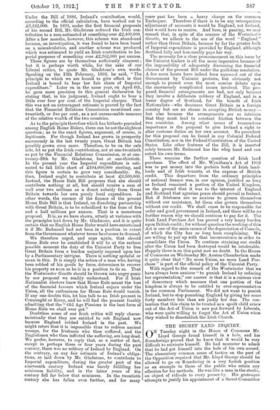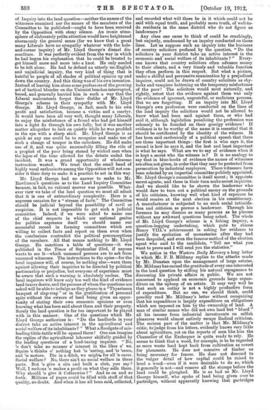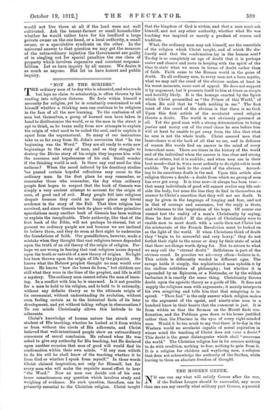THE SECRET LAND INQUIRY.
ON Tuesday night in the House of Commons Mr. Lloyd George found himself in a hole, and his flounderings proved that be knew that it would be very difficult to extricate himself. He had moreover to admit that he had got himself into the hole of his own accord. The elementary common sense of tactics on the part of the Opposition required that Mr. Lloyd George should be allowed to go on floundering in a very foolish position as an example to those of the public who retain any affection for his methods. He was like a man in the stocks, an object of ridicule to every passer-by. His grotesque attempts to justify his appointment of a Secret Committee of Inquiry into the land question—neither the names of the witnesses examined nor the names of the members of the Committee to be published—ought to have been received by the Opposition with stony silence. An ironic atmo- sphere of elaborately polite attention would have heightened enormously the general sense (for we know that a great many Liberals have no sympathy whatever with the hole- and-corner inquiry) of Mr. Lloyd George's dismal dis- comfiture. It was perfectly evident from the way in which he had begun his explanation that he could be trusted to get himself more and more into a knot. He only needed to be left alone. He had to defend an utterly un-English and unjudicial inquiry, the very kind of thing that is hateful to people of all shades of political opinion up and down the country. And this thing was of his own invention. Instead of leaving him alone some professors of the growing art of tactical blunder on the Unionist benches interrupted, booed, and generally harried him in such a way that the Liberal malcontents forgot their dislike of Mr. Lloyd George's scheme in their sympathy with Mr. Lloyd George. Mr. Lloyd George, in fact, much to his own profit and satisfaction, became a victim and a martyr. It would have been all very well, thought many Liberals, to enjoy the misfortunes of a friend who had got himself into a tight fix through his own folly, but it was another matter altogether to look on quietly while he was prodded in the eye with a sharp stick. Mr. Lloyd George is as quick as any one could be to recognize and make use of such a change of temper in the onlookers. He did make use of it, and was quite successfully filling the role of a prophet of the poor being stoned by wicked men when the lapse of the time allowed for the debate ended the incident. It was a grand opportunity of wholesome instruction wasted. We trust that the small band of highly vocal enthusiasts among the Opposition will not con- sider it their duty to make it a practice to act in this way.
Mr. Lloyd George had no answer to make to Mr. Rawlinson's questions as to the Land Inquiry Committee because, in fact, no rational answer was possible. What- ever view we take of the land question we must all admit that it is one of extraordinary complexity. Here is a supreme occasion for a " stream of facts." The Committee should be judicial beyond the possibility of cavil or suspicion. It is not impossible to get such a judicial committee. Indeed, if we were asked to name one of the chief respects in which our national genius for politics expresses itself we should name our successful record in forming committees which are willing to collect facts and report on them even when the conclusions contradict the political preconceptions of the members. All that means nothing to Mr. Lloyd George. He sanctions a table of questions—it was published in the Times of September 23rd, if anyone wants to see it—which unnamed persons are to ask from unnamed witnesses. The instructions to the spies—for the local inquirers will, of course, be nothing else—warn them against allowing their inquiries to be directed by political partisanship or prejudice, but everyone of experience must be aware that such a warning is absolutely useless. The local inquirers will know only too well the kind of evidence land taxers desire, and the persons of whom the questions are asked will be able to indulge as they please in a " Thyestaean banquet of clap-trap " or in the gratification of personal spite without the owners of land. being given an oppor- tunity of stating their own economic opinions or even knowing what has been said about them and their property. Surely the land question is far too important to be played with in this manner. One of the questions which Mr. Lloyd George authorizes is : "Do the landlords in your district take an active interest in the agricultural and social welfare of its inhabitants ? " What a floodgate of mis- leading tittle-tattle will be opened there ! One can imagine the replies of the agricultural labourer skilfully guided by the leading questions of a land-taxing inquirer. " No, 'e don't take no manner o' interest in the likes o' we. Squire 'e thinks o' nothing but 'is 'fluting, and 'is 'osses, and 'is motors. Die in a ditch, we might, for all 'e cares. Social welfare ? No, there ain't no social welfare in these parts. But 'e give a site and built a club, you say ? Well, I reckons 'e makes a profit on what they sells there. Why should. 'e give it Votherwise ? " And so on and so forth. Millions of pages could be filled with stuff of that quality, no doubt. And when it has all been said, collected, and recorded what will there be in it which could not be said with equal truth, and probably more truth, of well-to- do residents in the same district who do not figure as landowners ?
Any class one cares to think of could be crushingly, but unjustly, condemned by an inquiry conducted on those lines. Let us suppose such an inquiry into the business of country solicitors prefaced by the question, " Do the solicitors in your district take an active interest in the economic and social welfare of its inhabitants ? " Every- one knows that country solicitors often advance money to their clients, and a very timely and valuable function they often perform in this respect. But what a picture, under a skilful and persuasive examination by a prejudiced inquirer, could not be drawn of country solicitors as shy- locks and vampires battening on the temporary misfortunes of the poor! The solicitors would most naturally, and rightly, retort that the evidence against them was only the evidence of ignorant, ungrateful, or malicious persons. But we are forgetting. If an inquiry into Mr. Lloyd. George's own profession were conducted on the lines of the land inquiry the solicitors would not be allowed to know what had been said against them, or who had said it, although legislation penalizing the profession was solemnly to be founded on their gossipy evidence ! If evidence is to be worthy of the name it is essential that it should be certificated by the identity of the witness. It has been said sardonically of a political speech that there are three important things : the first is who says it, the second is how he says it, and the last and least important is what he-says. What are we to say of evidence when it is kept a secret who the witness is ? It is no analogy to say that in blue-books of evidence the names of witnesses are often not given, in order that they may be protected from persecution by industrial employers. These witnesses have been selected by an impartial committee publicly appointed. Mr. Lloyd George's committee is itself secret ; it appoints secret agents; and these in their turn make secret inquiries. And we should like to be shown the landowner who would dare to turn out a political enemy on the grounds of his criticism, knowing well what kind. of exposure he would receive at the next election in his constituency. A manufacturer is subjected to no such social intimida- tion and criticism as pursue a landowner. Through his foreman he may dismiss as many persons as he pleases without any awkward questions being asked. The whole of Mr. Lloyd George's scheme is a fishing inquiry, a. question-begging undertaking, which puts to shame Henry VIII.'s achievement in asking for evidence to justify the spoliation of monasteries after they had been despoiled, and even the famous method of the election agent who said to the candidate, " Tell me what you want to prove and I will send you the statistics."
We notice in the Western Daily Mercury a long letter in which Mr. F. B. Mildmay replies to the attacks made by Mr. Dunstan upon the management of large estates. Mr. Mildmayhas earned the gratitude of every one interested in the land question by stifling his natural repugnance to discussing his private affairs in public. We are not concerned to applaud on economic grounds large expen- diture on the upkeep of an estate. It may very well be that such an outlay is not a highly productive form of expenditure. But no one, we should think, could possibly read Mr. Mildmay's letter without recognizing that his expenditure is largely expenditure on obligations which are imposed on him by the ownership of land. A man of similar means who did not own land but " blued " all his income from industrial investments on selfish pleasures would. almost entirely escape Radical criticism. The serious part of the matter is that Mr. Mildmay's critic, to judge from his letters, evidently knows very little about agriculture, yet on the reports of men like him the Chancellor of the Exchequer is quite ready to rely. He seems to think that a wood, for example, is to be regarded as mere waste land kept back from cultivation as covert for pheasants. He does not conceive of timber as being necessary for fences. He does not descend to the vulgar detail of how capital could be raised to level a wood—even if it were desirable to do so, which it generally is not—and remove all the stumps before the land could be ploughed. He is as bad as Mr. Lloyd George himself, who spoke of land being given over to partridges, without apparently knowing that partridges
would not live there at all if the land were not well cultivated. Ask the tenant-farmer or small householder whether he would rather have for his landlord a large private owner on the one hand, or a local authority, a small owner, or a speculative syndicate on the other. In. the universal answer to that question we may get the measure of the extraordinary injustice the Government are guilty of in singling out for special penalties the one class of property which involves expensive and constant responsi- bilities. Let us have inquiry by all means. We desire it as much as anyone. But let us have honest and public inquiry.
















































 Previous page
Previous page